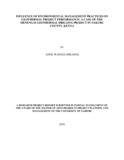| dc.description.abstract | Environmental management is proving vital in development of projects in Kenya. Gone are the
years when projects were carried out without environmental impact assessments and audits. Today,
the World Bank, International Finance Corporation and ISO Standards e.g. ISO 14001:2015 are
utilized to certify that a project is fit before it is implemented. Environmental management has its
pros and cons. Many individuals consider its downsides as requiring a large amount of resources,
labour intensive and time consuming. The positive impacts of this practice include attracting donor
funds, good public outlook, increased project acceptance, environmental conservation, mitigating
negative environmental impacts brought about by project development, just to mention a few. The
specific objective of the study was to investigate the impact of environmental management in
implementation of GDC projects, more specifically, the performance of the Menengai Geothermal
Drilling Project. The study employed a descriptive research design where data was collected from
employees of the Geothermal Development Company’s Central Rift Region using questionnaires.
Data was then analyzed using the Statistical Package for Social Sciences (SPSS) Version 20. A
sample of 88 participants was selected from the employees’ population using the simple random
sampling method and were asked to fill the questionnaires. There was a positive response regarding
the influence of budget allocation towards performance of the Menengai Geothermal Drilling
Project (MGDP) at an average of 44.1% agreeing and 23.0% strongly agreeing. 21.7% were not
certain concerning this aspect while 9.0% and 2.1% disagreed and strongly disagreed respectively.
Concerning the influence of environmental management implementation on the performance of
the MGDP, there was a positive response averaging at 44.2% agreeing and 37.6% strongly
agreeing. 11.9% were not sure, while 4.8% and 1.4% disagreed and strongly disagreed
respectively. There was a positive response regarding the involvement of stakeholders in
contributing to the performance of the MGDP averaging at 53.2% agreeing and 21.7% strongly
agreeing. 20.3% were not sure, 3.8% and 1.0% disagreed and strongly disagreed respectively.
Among the three independent variables, it was concluded that stakeholder involvement had the
most significant effect on the performance of the Menengai Geothermal Development Project
(MGDP). The key recommendation of the study is that GDC Management should focus on
increasing/ supporting stakeholder involvement initiatives so as to increase the project’s chances
of eventual success as it had the highest significant relationship with geothermal project
performance | en_US |



